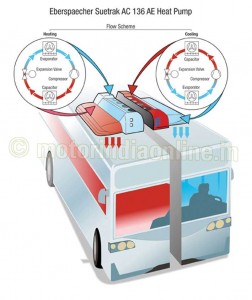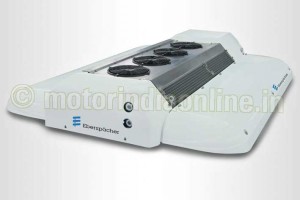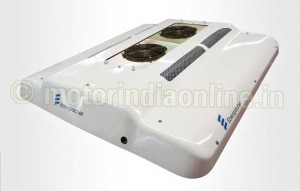
In the public transport of the future, electrical drive concepts will play a crucial role. The further optimization of the energy efficiency of accessories is an important issue here. At Busworld in Kortrijk (Rambla / Stand R-41), the bus climate control specialist will be presenting the groundbreaking AC 136 AE heat pump – a roof-mounted AC solution with heat pump, which cools and heats efficiently. Alongside this, the new climate control system generations AC 420 G2 for mini-buses and AC 515 G2 for midi-buses will also be displayed.
Electric buses are the future of urban passenger transport, a fact which will also enhance the significance of efficient climate control concepts.
Especially for electric buses, Eberspaecher Suetrak has developed the roof-mounted AC 136 All Electric (AE) climate control system which, amongst others, is already being used in an electric trolleybus as part of a pilot program in Geneva. In Kortrijk, the company is now presenting the version with integrated heat pump – a system that combines efficient cooling and heating.

“In summer, electric buses are cooled by the electrically operated AC system, but in winter they lack an effective and powerful heating solution, because without a combustion engine practically no waste heat is available for heating up the passenger compartment”. This is how Eberhard Wolters, General Manager Eberspaecher Suetrak, explains the challenge they faced. “We’re meeting this with the integrated and highly efficient AC 136 AE heat pump thermal management solution.”
The AC system comes with reversible refrigeration circuit for cooling and heating. The innovative system with integrated heat pump function is being used for the first time in an electric bus from the Belgian bus manufacturer, Van Hool. Depending on demand and outside temperature, the AC 136 AE heat pump either cools or heats the passenger compartment. The technology is based on a reversible refrigeration circuit for which all the components of the system are designed.
In the cooling mode, the heat from the interior of the bus is absorbed via the low pressure, low temperature liquid refrigerant in the evaporator, by a process of evaporation. After compression, the heat from the refrigerant is dissipated to the ambient air by the condenser, and the refrigerant is condensed. The refrigerant is then passed through an expansion valve, where its temperature and pressure are reduced, and into the evaporator where the cycle is completed.
During heating, the cycle operates in the opposite direction, i.e., the evaporator now acts as a condenser and the condenser as an evaporator. Consequently, the heat can now be dissipated at high temperature into the vehicle by the evaporator (now acting as a condenser). The refrigerant is then passed through an expansion valve where it evaporates in the condenser (now acting as an evaporator) absorbing heat from the cold ambient air. This process is possible because the low pressure, low temperature liquid refrigerant has a lower temperature than the ambient air. After compression, the heat from the refrigerant is dissipated to the vehicle by the evaporator, now acting as a condenser, and the cycle is completed.

“The biggest advantage of the AC 136 AE heat pump is its outstanding efficiency”, states Eberhard Wolters. “In comparison with electric auxiliary heaters, with the same energy input it generates approximately three times as much heat.”
As there is space for all the components for the new twin function in the system, it fits without the need for additional units on the bus roof. Therefore the dimensions of the heat pump unit are extremely compact. “In addition, the same roof interfaces are observed as with the AC 136 AE, making the installation of the entire AC 136 AE family very simple”, explains Wolters.
Optimized climate control solutions for mini- and midi-buses up to 13 kW cooling capacity, 15 per cent less weight and a length reduced to 1,580 millimeters for all construction types – these are the highlights of the new AC 420 G2, which Eberspaecher Suetrak will also be introducing at Busworld. The climate control system, suitable for mini-buses, uses only one condenser heat exchanger and has an optimized circuit layout. As a result, depending on the performance capacity required, the new AC 420 generation still only weighs a maximum of 48 kilograms. The system, perfectly designed for hot country regions, can now be mounted even more easily and quickly due to its standard dimensions and connection specifications. Thanks to the optimized maintenance access points it is also extremely easy to service: all sub-assemblies can be reached with just a few hand movements.
The company is also showing the latest midi-bus roof-mounted AC system in the shape of the AC 515 G2. The design, featuring standardized components, plus the same roof interface, makes installation even less complicated. In addition, the weight compared with its predecessor model has been further reduced and, last but not the least, the brushless blower of the new AC 515 G2 ensures virtual maintenance-free operation during use.

The Eberspaecher Group offers suitable air-conditioning for every requirement of innovative vehicle heaters for urban buses and coaches from the portfolio of the Eberspaecher Group complete its trade fair presence. These include the Hydronic M2, a bus-specific water heater with an excellent level of efficiency. The underfloor-mounted pre-heater brings the vehicle heating circuit rapidly and efficiently up to the desired temperature, and thus ensures a pleasant and comfortable atmosphere on board at all times. The unit is biodiesel-compliant and has extensive diagnostic options.
To take optimum advantage of this comfort, Eberspaecher offers the opportunity to control the heater very conveniently using a smartphone app known as EasyStart Call. Alongside its traditional use for a specific vehicle, via the app two pools each containing a maximum of five vehicles, can also be controlled.
Beyond thermal management for large buses, the group also supplies customer-specific climate control applications for special-purpose vehicles such as ambulances or armored cars. Eberspaecher is one of the few companies offering integrated climate control solutions – for heating and cooling – for this segment. The system developers design tailor-made climate control solutions from a multitude of components, for OEM customers, vehicle body manufacturers as well as for standardized aftermarket solutions.